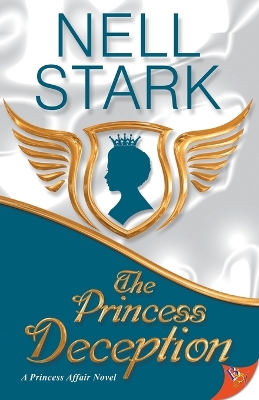This is loosely based on Shakespeare’s Twelfth Night, which is one of my favorite plays. This is the third book in the Princess Affair series. I read it as a standalone, and the only thing I found confusing was keeping the two couples from the previous book straight. I had some issues with how this book plays out, so massive spoilers.
Duke (her full name is Missy Duke, but she prefers to go by her last name) is an ex-soccer player who’s just starting out as a sports journalist, and her first assignment is covering the joint Netherlands/Belgian bid for the World Cup. While she’s out to her teammates, she’s not out in public, partially because of her religious family. Viola is the Belgian princess, and her main interest is in photography, not soccer. One major deviation from the play is that Twelfth Night is a romantic comedy full of hijinks, while this book is much more serious. For starters, the beginning of the book plunges us into the emotional turmoil of Viola’s twin brother being hospitalized after a drug overdose, and all the guilt and worry that entails. In order to keep the World Cup bid from being derailed (something her brother cares deeply about), Viola decides to disguise herself as Sebastian and continue on as if nothing is amiss. It’s certainly a selfless action, since the other part of her motive is to keep the press from realizing he’s in rehab and to give him more time to recover.
“The problem was that if she confessed to being a lesbian, she would have no excuse to flirt more aggressively with ‘Sebastian’ and possibly make some use of the sparks between them. But if she said nothing, Viola would likely assume her to be straight and therefore unavailable.
It was a Catch-22…if Duke were being an idiot. She wasn’t here to get a date with a princess; she was here to learn as much as possible in the service of exposing a cover-up. If allowing Viola to believe her to be straight was a means to that end, so be it.”
Duke almost immediately realizes that Viola is pretending to be her brother. In the original play, part of the humor is that no one realizes that “Seb” is actually Viola, though obviously that wouldn’t fly so well for lesbian romance! What I didn’t understand is why Duke felt the need to uncover why Viola was disguising herself. Duke’s supposed to be a sports reporter, not a tabloid reporter, and I can’t think of single ethical reason behind it. To her credit, once she finds out why Sebastian is in hiding, she decides to come clean, but a unscrupulous colleague (and, seriously, a ridiculously one-dimensional villain) goes against her wishes to publish the article.
Viola starts out angry at the beginning of the book – at her brother for getting addicted to drugs, at his bodyguard for not stopping him, at herself for not realizing something was wrong – but the only person she ends up taking that anger out on is Duke after the article is published. It’s somewhat understandable – Viola was outed by a tell-all article from an celebrity ex-lover – but again a major departure from the play, where it’s only at the very end that the ruse is revealed. Viola, after all, is the one who’s attempting to deceive the world, not Duke! There’s an… almost-revenge angry sex scene, which sat a bit wrong with me. It’s not that Viola’s pretty dominant in bed or that there was lack of consent, just that Viola decides the only way to get Duke out of her head is to screw her once, on her terms. There was this whole subplot about finding out who was with Sebastian on the night he overdosed, and while it felt like we got some of those questions answered, it was not really full addressed. It just served as an excuse for Duke to run into Viola again, and I would’ve liked to have seen it wrapped up a bit more.
This all sounds pretty negative, but I did enjoy the book. It certainly held my attention while I was reading it, and it was well-paced. I liked that both women had a friend group to go back to and recover with after the breakup (if you can even call it that), and I liked how introspective Duke was about the end of her soccer career and the boundaries placed on Viola by her position. I liked how (Missy’s family aside) everyone was very accepting of both character’s sexuality, and there was a particularly touching recounting of how the palace staff reacted when Viola was forcibly outed. I enjoyed learning about Viola’s life as a modern-day princess, with all the security messes and privileges and nonsense that comes with it.
Overall, this felt like a 3.5 star read to me. I don’t think it’s the book’s fault, it’s more that it hit some of my buttons, in particular how one-sided the consequences of each character’s lies were. If that’s not something that bothers you, then I think you’d enjoy the book a lot more.
I received this book for free from NetGalley in exchange for an honest review. This does not affect my opinion of the book or the content of my review.
